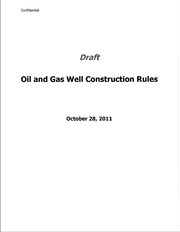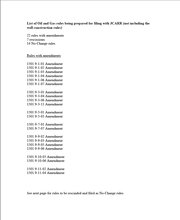Fracking rules to be more stringent
By Karl Henkel
YOUNGSTOWN
Ohio plans to scrap some fracking regulations in lieu of more- stringent rules, but some antifracking advocates remain skeptical about the proposed changes.
Oil and Gas Well Construction Rules Draft
Draft of oil and gas well construction rules
SB 165 Analysis
Ohio Legislative Service Commission Final Analysis of Sub. S.B. 165
Oil and Gas Rules to be filed with JCARR
List of Oil and Gas rules being prepared for filing with JCARR (not including the well construction rules)
Fracking is the process in which water, chemicals and sand are blasted into rocks thousands of feet below the ground to unlock natural gas and oil.
The process has been around for years, but until recently, drilling could only be done vertically, not horizontally.
As a result of the new technology, the state in 2010 passed Senate Bill 165, fracking-related legislation that placed restrictions on drilling and brine disposal, among other actions.
But because the language in SB 165 supersedes outdated drilling regulations, the state now has to strike the old restrictions from the Ohio Revised Code.
For instance, the state is seeking to scrap the minimum distance of 75 feet previously required between a well and standing structure or nearby property.
The appearance of deregulation, however, comes with the stipulation that SB 165, which requires a minimum distance of 150 feet, is a more-stringent regulation.
“You have to go and cut those [regulations] out of the rules, because they are no longer consistent with the law,” said Heidi Hetzel-Evans of the Ohio Department of Natural Resources, who likened the process to “house cleaning.”
There’s a similar misconception regarding the regulation requiring oil- and gas-drillers to outline their brine-disposal plans.
The state requires brine, a salt-water byproduct of fracking, to be disposed of in one of three ways, either by injection well, on road surfaces or by any method approved by an ODNR administrator.
In pre-SB 165 days, drillers had to report — in advance of drilling — where they planned to dispose of brine wastewater.
“In advance, they often wouldn’t know [the precise location] so we got a laundry list of places where it could go,” she said.
Current SB 165 regulations require drillers to report that information on Material Safety Data Sheets, Hetzel-Evans said.
But Vanessa Pesec, president of the Network for Oil and Gas Accountability and Protection, said that regulations should require more planning when it comes to drilling decisions.
“We should be reviewing the companies up front that they have a plan to dispose of brine,” she said. “I think that much of this stuff should be done before hand.”
ODNR is taking public comments on the amendments before it will file them with Ohio’s Joint Committee on Agency Rule Review.
The comment period ends Friday. Those wishing to voice their opinions on the changes can do so by emailing minerals@dnr.state.oh.us.
At the same time, the state has drafted additional rules in addition to SB 165 regarding well construction.
The rules specifically target well-casing standards, well-integrity tests and well-construction record-keeping.
Pesec told The Vindicator that the rules are too vague, citing a Natural Resources Defense Council report on the proposed rules.
Ohio Gov. John R. Kasich this week said Ohio’s regulations will remain stringent.
“We will have tough and clear regulations,” said the governor, in an interview recapping his first year in office.
“It will be things that affect places like high pressure pipelines, gathering lines, knowing the kind of chemicals that we are using in these operations.”
Hetzel-Evans said the state reviewed regulations from about a half-dozen states and the federal Environmental Protection Agency and believes the new restrictions will be among the most forceful.
“When passed, we expect these rules to be some of the strongest rules in the nation,” she said.
 43
43



